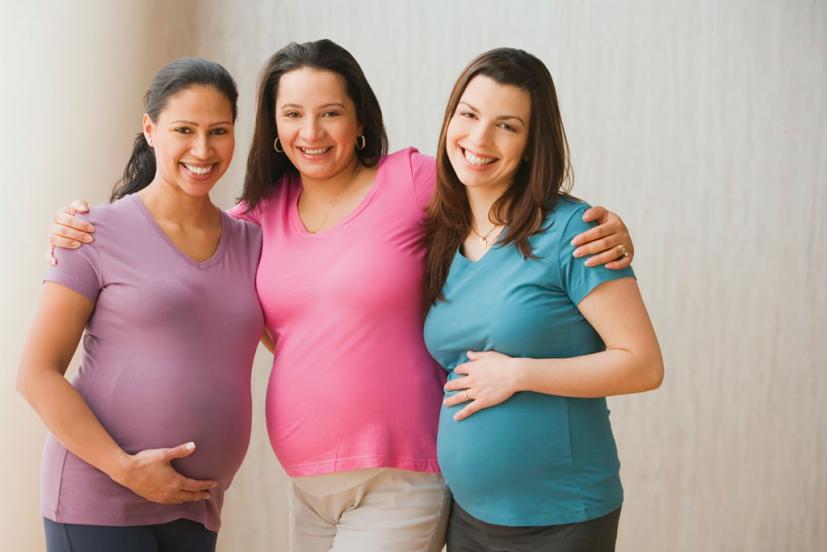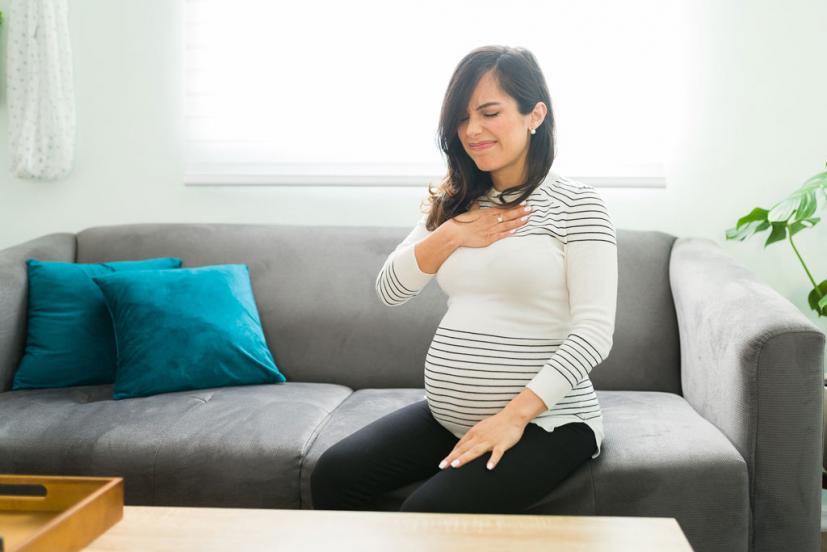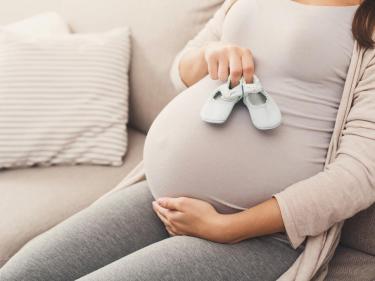The Bump Is Just the Beginning: Body Changes During and After Pregnancy

Marin Mommies presents a sponsored article from MarinHealth Medical Center in Greenbrae.
Pregnancy is a series of small changes leading up to the big change: becoming a mother. It’s only natural to focus on that ever-growing bump, but your body is literally changing from head to toe:
Bleeding Gums and Extra Saliva
This is no time to skip your dental appointments. Many women get more cavities during pregnancy. Some women also experience bleeding gums, gingivitis, and halitosis. Pregnancy hormones and morning sickness can cause you to salivate more, and more frequently.
Voice Changes
Estrogen and progesterone may cause a slight swelling in your vocal cords. Singers sometimes find they lose a few high notes while gaining a lower register they never knew they had!
Nasal Congestion
Bad morning sickness or heartburn sometimes comes with a stuffy nose. Nasal congestion is common and can present throughout the duration of pregnancy. Try sleeping with your head elevated, take a warm shower, or fill a sink with hot water and “steam” your face to clear sinuses. Additionally, some women will develop snoring during pregnancy.
Tummy Troubles
Just when the morning sickness ends, heartburn begins. Pregnancy hormones cause smooth muscle to relax, and this can lead to acid reflux, heartburn, gas, bloating, and constipation. Do not take over-the-counter medication for these symptoms without first checking with your doctor or midwife. Contact your provider for a list of safe, over the counter medicines.
Sensory Changes
Many women experience a heightened sense of smell and taste. You may be suddenly disgusted by certain smells, such as smoke, fried foods, meat, greasy foods, or coffee.

Skin Changes
The skin is the body’s largest organ and pregnancy can cause it to change in many ways:
- Your body is making more pigment. This may manifest as chloasma, brownish or yellowish patches on your face. If you develop chloasma, wear sunscreen and stay out of the sun. Some women develop a dark line down the midline of the lower abdomen, known as the linea nigra. Your nipples, external genitalia, and anal region may also darken. Existing moles and freckles may get larger and darker.
- Increased blood volume during gestation can stimulate the sebaceous glands, resulting in acne.
- You may see hair growth on your stomach, chin, arms, and other areas. This will quickly disappear after birth.
- Some women develop skin tags.
- If you live in a hot climate or are pregnant during the summer, you may perspire more and develop heat rash.
The Bump
- The skin on your belly may feel itchy and dry as it stretches. Your physician or nurse midwife can recommend special creams that can help.
- Stretch marks are very common and never completely disappear.
- As your uterus grows, it weakens your stomach muscles and pushes them apart. After birth, you may notice a gap in between the rectus abdominus, the two large muscles that run down either side of your stomach. Known as diastasis recti, this gap normally resolves itself on its own in the first eight weeks after birth. If it doesn’t, working with a pelvic health physiotherapist can help you regain abdominal strength and heal the gap. How well your tummy bounces back after birth depends on posture, genetics, and how much pregnancy stretched your skin and tissues.
Hair and Nails
Many pregnant women notice changes in hair texture. Hair and nails also grow faster. Nail texture may change, becoming stronger or more brittle. Hair and nail changes are temporary and revert to normal postpartum. Many women experience temporary postpartum hair loss. This peaks around four or five months after delivery.
Bladder Glitches
As your baby grows, pressure on your bladder increases. You may even experience stress incontinence–leakage when coughing, sneezing, or exercising. Stress incontinence often continues postpartum, affecting four in ten women. If leakage is still a problem six weeks after delivery, talk to your provider or a pelvic health specialist.
Toilet Troubles
The extra progesterone your body produces during pregnancy slows down the passage of food through your gastrointestinal tract, leading to constipation. This can worsen in the third trimester, when your uterus may push against your large intestine, interfering with bowel movements. Straining a lot to go to the bathroom enlarges the veins of the rectum, leading to the formation of hemorrhoids. Pregnancy is a good time to add fiber to your diet.
Breast Growth
You may go up several bra sizes as your pregnancy progresses. Some women experience breast discharge starting in the middle of the second trimester. This is perfectly normal and means your body is preparing for breastfeeding. Right after giving birth, estrogen and progesterone levels drop, and prolactin, the hormone that helps you make breastmilk, kicks in. This change usually makes your breasts even bigger. Once you stop breastfeeding, your post-pregnancy breast size is hard to predict. Your breasts could stay bigger, get smaller, or revert to their pre-pregnancy size. Weight gain during pregnancy may lead to sagginess.
Varicose Veins
Pregnancy hormones enlarge your veins to accommodate the increased amount of blood in your body. When blood pools in those veins, it can lead to varicosities. These may fade or even go away after pregnancy. To help prevent them from developing in the first place, avoid standing or sitting for long periods and put your legs up when you’re seated, and consider wearing compression stockings or hosiery.
Loose Joints
To prepare the birth canal for delivery, your body makes relaxin, a hormone that loosens the ligaments, often affecting balance and stability as your center of gravity changes. This raises your risk for strains, sprains, and overstretching. Be careful when exercising or lifting things and avoid sudden, jerky movements.
Fat Feet
Your feet are “growing” for two reasons: looser ligaments and fluid retention. Sandals, slides, and flip-flops will be more comfortable, especially in your last trimester. Some women find that their feet remain a half size larger after birth–a perfectly good excuse to go shoe shopping after baby arrives!
If you are concerned about any changes in your body or are experiencing any unusual symptoms, never hesitate to call your healthcare provider! Don’t have a provider yet? Click here for a list of MarinHealth® OBGYNs and midwives.





